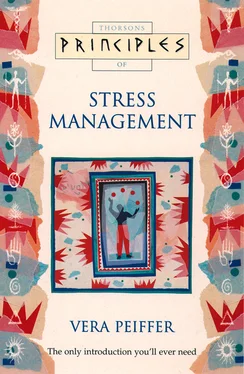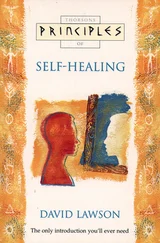Published by HarperCollins Publishers
77–85 Fulham Palace Road,
Hammersmith, London W6 8JB
1160 Battery Street,
San Francisco, California 94111-1213
www.harpercollins.co.uk
Published by Thorsons 1996
© Vera Peiffer 1996
A catalogue record for this book is available from the British Library
Vera Peiffer asserts the moral right to be identified as the author of this work
All rights reserved under International and Pan-American Copyright Conventions. By payment of the required fees, you have been granted the nonexclusive, nontransferable right to access and read the text of this e-book on-screen. No part of this text may be reproduced, transmitted, downloaded, decompiled, reverse-engineered, or stored in or introduced into any information storage and retrieval system, in any form or by any means, whether electronic or mechanical, now known or hereinafter invented, without the express written permission of HarperCollins e-books.
HarperCollinsPublishers has made every reasonable effort to ensure that any picture content and written content in this ebook has been included or removed in accordance with the contractual and technological constraints in operation at the time of publication .
Source ISBN: 9780007273188
Ebook Edition © AUGUST 2014 ISBN: 9780008110420
Version: 2014-08-18
FOR MY FRIENDS GEORGES AND LYN
Cover
Title Page
Copyright
Dedication
Introduction
PART I STRESS – HOW IT HAPPENS
1 What Stress Is and What It Is Not
2 Are You a Stress-prone Type?
3 Questionnaire: Check Your Personality Stress Factors
4 What Is Causing You Stress?
PART II WHAT HAPPENS WHEN YOU FALL INTO THE STRESS TRAP …
5 Physical Reactions
6 Mental and Emotional Reactions
7 Behavioural Reactions
8 Questionnaire: What Is Your Stress Level?
PART III … AND HOW TO CLIMB OUT OF THE STRESS TRAP
9 How To Stop Yourself from Overworking
10 So You Thought You Knew How to Breathe …
11 Giving Your Body Time Off
12 Taking a Mental Holiday
13 Sleeping Better
14 Dealing with Difficult People
15 Using Anger Constructively
16 How to Talk about Things You Would Rather Avoid
17 Accentuate the Positive
18 De-stress Your Life
19 Alternative Ways to Unwind
Summary
Keep Reading
Acknowledgements
Also by the Author
Also in the Series
About the Publisher
Anyone who has ever had to struggle through a prolonged period of work overload, be it at home or out in the workplace, will know what it feels like to be physically exhausted and mentally overwrought. Whereas you are perfectly capable of dealing competently with life’s ups and downs when you are unstressed, any hiccups in the daily routine become an emotional crisis once the pressure exceeds a certain threshold.
It is an unpleasant experience to feel out of control and unable to stop yourself from overreacting. You watch yourself shouting at the kids or soldiering on at work even though you are too tired to think straight, seemingly unable to stop yourself.
Stress and all its unpleasant side-effects can arise from a great many different factors; work overload is just one of them. Other life events which can put you under pressure are changes in your circumstances, for example if a family member gets seriously ill or if you unexpectedly suffer financial difficulties. As a rule of thumb you could say that any event that significantly changes your daily routine is a potential trigger for stress. I say ‘potential’ because a lot will depend on your general attitude to change. Stress is not just generated by circumstances; your attitude towards the circumstances will have a significant impact on how you cope.
This book looks at a variety of potential stress-triggers. You may be surprised to learn that even events which we would generally label ‘positive’, such as a promotion or a holiday, can create stress! You will also learn how to deal with difficult situations in a more constructive way, on not just a practical but also an emotional level. You may not be able to cut out all challenges from your life – nor may you want to – but you can certainly do a lot to eliminate unnecessary stresses. You have a lot more power inside you than you might think; Principles of Stress Management shows you how to access this power and how to make use of it. In addition, this book provides you with questionnaires for self-assessment and mental exercises which will help you take control of your life, as well as useful information and tips on foods, physical exercise and supplements which can strengthen your resilience to stress. Why be harassed if you can be composed? Why fight if you can play? You may not be able to see a way out of your situation, but it is there before you.
As you read through this book you will quickly find the chapters that are relevant to your particular circumstances, as well as the solutions that suit you best. You will find that you can rid yourself of unnecessary stress and heighten your general sense of well-being at the same time, so that you feel more energetic, more in control, better about yourself and better within yourself. Why not put some of the suggestions in this book into practice? You have nothing to lose but stress!
PART 1
In this first section we will look in detail at what constitutes ‘stress’, as we commonly call the experience of negative pressure. As your personality plays a part in how you deal with stress, this section includes descriptions of various personality types (their strengths and weaknesses, etc.), followed by a questionnaire ( see ) which will allow you to assess which type you come closest to. Learning about yourself allows you not only to take better care of yourself but also to make positive changes more easily. The better you understand what makes you tick, the greater the control you have over changing your life for the better.
In Chapter 4 we will examine the most common external stressors that may play a part in the build-up to stress, both in work and private life. Depending on your personal beliefs and attitudes, you will deal with these outside stressors more or less effectively. People respond to difficult situations according to their past experiences by using, either consciously or subconsciously, coping strategies which they have acquired over the years. How you cope with stress will also depend on how much external support you get while you are in the difficult situation. All these factors – personality, beliefs, past experiences and external support – work together to shape your physical and emotional reactions to stress, which ultimately determine how much you are affected by a difficulty and how well you deal with it.
1
WHAT STRESS IS AND WHAT IT IS NOT
Generally speaking, stress can be caused by our need to adapt physically, mentally and emotionally to a change. This, of course, does not have to be a negative process. If you have finally achieved a promotion which you have worked towards over a long period of time, this is likely to be a very pleasant change which fills you with excitement and satisfaction. However, if you have been persuaded by your superiors to go for the promotion when you do not really feel ready for it, you can end up feeling very nervous and unconfident when this change takes place.
A small amount of stress is useful; it adds interest and motivation to life and keeps us on our toes. Changes that we perceive as moderate are not just harmless but also invigorating, as our adaptability needs to be trained regularly to stay in working order. As we practise going with the flow and dealing with changes, we become stronger. However, when the changes become too great or when they influence our lives negatively over a period of time, our capacity to adapt can become overstretched.
Читать дальше












